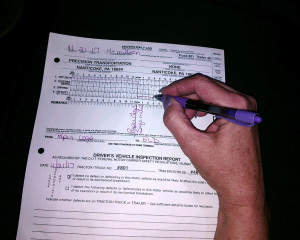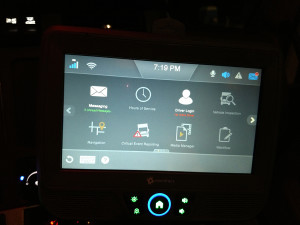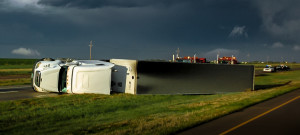 This is the month that we will find out if all the recent efforts to stop the ELD Mandate from going into effect will be too late or successful – whether we will be using paper or plastic logbooks from here on out. Either way, it has got drivers communicating with lawmakers on this and other issues regarding truck regulations, and that is a good thing. Educating the legislators who write the trucking rules would be a great start to (hopefully) getting smarter laws.
This is the month that we will find out if all the recent efforts to stop the ELD Mandate from going into effect will be too late or successful – whether we will be using paper or plastic logbooks from here on out. Either way, it has got drivers communicating with lawmakers on this and other issues regarding truck regulations, and that is a good thing. Educating the legislators who write the trucking rules would be a great start to (hopefully) getting smarter laws.
For years I’ve said most people get paid time and a half when they work overtime hours, but professional truck drivers get fined and/or shut down when they go overtime. Why is that? There are plenty of other dangerous jobs out there that require people to be “at their best” all the time, like firefighters and cops, but they get to work overtime (and are paid handsomely to do so). If the lawmakers would just get out here and experience firsthand life on the road in a truck, maybe, just maybe, they would write laws that really are aimed at truly helping make our roads safer. I’m not anti-regulation – we must have rules – if not, there would be companies and drivers that would be out of control in so many bad ways. But, I think we should have sensible regulations.
 The motoring public hears, “It will make our roads safer and save 26 lives a year,” and get all warm and fuzzy. I am all for saving lives, but they should be taking a hard look at and thinking about how the laws will work in the real world, as well. Trucking is not just a job, it never has been and never will be – it’s a lifestyle that you choose – and it isn’t for everyone.
The motoring public hears, “It will make our roads safer and save 26 lives a year,” and get all warm and fuzzy. I am all for saving lives, but they should be taking a hard look at and thinking about how the laws will work in the real world, as well. Trucking is not just a job, it never has been and never will be – it’s a lifestyle that you choose – and it isn’t for everyone.
I’ve chatted with many people over the years at grocery stores, the doctor’s office, nail salons and lots of other places, and I have no problem telling people that I drive a truck and asking them if they have ever been in one. Some have, but most have not. The ones who have not been in a truck are surprised when I start telling them about what we can and cannot see from our seat, and even more surprised when I tell them about the time we are held up at shippers and receivers and how much they charge us for the “privilege” to unload. And, when I tell them they (as consumers) are the ones paying for this, I have their attention.
Most people are pretty fascinated by what we truckers do, but they really do not understand the industry. I believe it is our job to educate the motoring public about our industry – the real trucking industry – not the one they see on TV or in the movies. No book or video can teach what it’s like to sit in the seat of a big truck. I think everyone should have to do just that when getting their license – sit in the seat and look out over that hood with a car in their blind spot. Providing “hands-on” teaching for drivers of 4-wheelers would be a big step towards safer roads.
 Professional truck drivers are not cookie-cutter people, and the trucks they drive are large pieces of equipment that occasionally break down, despite even the best preventative maintenance programs. We are not like a computer that can be programmed to shut down at a certain time and get up at a designated time and go to work. When I got on the road and started running long haul back in 1986, one of the first things a driver told me was, “Common sense will take you a long way out here.” The rules and regulations they are coming up with for trucks and truckers today are in serious need of a common-sense overhaul!
Professional truck drivers are not cookie-cutter people, and the trucks they drive are large pieces of equipment that occasionally break down, despite even the best preventative maintenance programs. We are not like a computer that can be programmed to shut down at a certain time and get up at a designated time and go to work. When I got on the road and started running long haul back in 1986, one of the first things a driver told me was, “Common sense will take you a long way out here.” The rules and regulations they are coming up with for trucks and truckers today are in serious need of a common-sense overhaul!
I keep hearing people say, “You have to plan your trip” – well, that is wonderful in a perfect world or if you have a crystal ball, but in the real world (of trucking), that isn’t always possible. How do you “plan” for the accident that just happened in front of you and shut the road down for hours? How do you “plan” for the shipper that holds you up for six hours after your appointment or the receiver that takes seven hours to unload three pallets? How do you “plan” for the weather that you thought you could get ahead of, only to find out that the weatherman’s “prediction” was wrong and now you are stuck in it? These things don’t happen every day, but they can happen often enough.
How often do we arrive at a pickup or delivery with what should be plenty of hours, but then the shipper or receiver takes so long to load or unload the trailer that you are now out of hours – and then you are told that you can’t stay at their location – that you must leave. All you can do is leave, knowing that you are in violation of the hours of service, and there is nothing you can do about it – and the people telling you to go don’t care. Dealing with this issue, I feel, is one of the most important problems facing our industry today – and with an ELD, it will only make things worse.
 There needs to be some reasonable flexibility in the regulations governing trucks and their drivers. Before, when we had split sleeper berth times and the clock stopped when you went in the sleeper berth, it allowed the flexibility of real-world trucking to go on, and the driver could make the safest choices for how to deal with the situation. Trucking is not like punching the 9:00 to 5:00 time clock every day – many situations vary depending on the type of trailer that you pull and the freight that you haul, and those variables need to be considered.
There needs to be some reasonable flexibility in the regulations governing trucks and their drivers. Before, when we had split sleeper berth times and the clock stopped when you went in the sleeper berth, it allowed the flexibility of real-world trucking to go on, and the driver could make the safest choices for how to deal with the situation. Trucking is not like punching the 9:00 to 5:00 time clock every day – many situations vary depending on the type of trailer that you pull and the freight that you haul, and those variables need to be considered.
Taking the fight to Washington DC, a group of truckers recently parked their trucks in places many people thought they never could. Apparently, the truckers parked their rigs in the government worker’s parking spots after the people went home for the day. In the morning, when these government employees with the DOT came back to work, their parking places were filled, which forced them to find alternative parking for a couple of days. Welcome to our world! Try finding a place to park with a 48’ or 53’ trailer behind you at 2:00 a.m., when all the truck stops and rest areas are full, forcing a driver who is tired and/or out of hours to continue driving until they can find a safe place to park. Parking spots, or lack thereof, is another problem that will only get worse with ELDs in our trucks.
After this protest, ATA President Chris Spear made a comment that lumped the “amateur-hour advocacy groups” together with the anti-truck crowd in holding to an incorrect notion of “What’s best for our industry…” I think that drivers who have millions of safe miles might be a bit less amateur than a man who has not ever been a trucker. Who really knows better the things that we are up against when we chose to drive a truck for a living? When you get on the road, all these things become pertinent – the roads, traffic, shippers, receivers, dispatchers, the weather, safe parking, and the list goes on.
 We were all a new driver once upon a time. It was different years ago than it is today and, sadly, those days are gone. The only way anyone learns to drive a truck is by doing it. If safety is what our politicians are really concerned about, they should by improving the programs training new drivers. The more time new drivers have behind the wheel, the better drivers they will be. Period. Some of the minimum hours they have on the road in real world situations is not nearly enough. Experience will always be the best teacher, and all the drivers who have been out here for decades and have multiple millions of safe miles won’t be out here forever. More and more of these drivers are retiring or saying, “Enough is enough!” and going home.
We were all a new driver once upon a time. It was different years ago than it is today and, sadly, those days are gone. The only way anyone learns to drive a truck is by doing it. If safety is what our politicians are really concerned about, they should by improving the programs training new drivers. The more time new drivers have behind the wheel, the better drivers they will be. Period. Some of the minimum hours they have on the road in real world situations is not nearly enough. Experience will always be the best teacher, and all the drivers who have been out here for decades and have multiple millions of safe miles won’t be out here forever. More and more of these drivers are retiring or saying, “Enough is enough!” and going home.
For decades, we used paper logs and paper road maps, and when we wanted to call dispatch, a customer or home, we stopped and used a pay phone and, for the most part, we felt safe and got the job done. Today, everything is different – some better, some not – but forcing us to use an electronic logging device will only bring more light to our existing problems, and create some new ones, as well.
Driving is a privilege, not a right, and careless drivers (with four wheels or 18) should be held accountable for their bad decisions. The state of Ohio has done a study showing that cars cause 90% of the accidents involving trucks. Because of this, they are going to start ticketing cars driving unsafe around big trucks. I hope that more states follow Ohio’s lead – doesn’t it make more sense to do that then put more restrictive and senseless regulations on the trucks that make our nation move? I sure think so! Time will tell if we still get the choice between paper or plastic.
